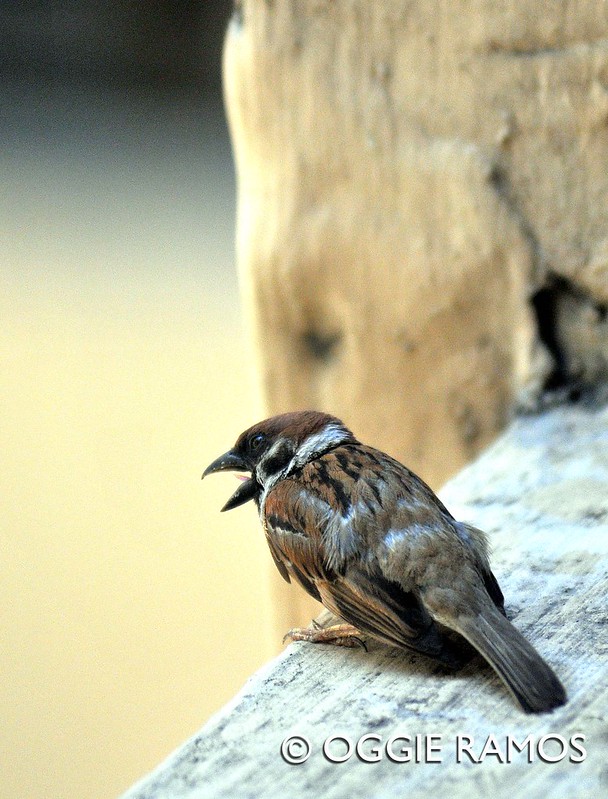 |
| Sparrow singing outside my window |
Considering that workers one floor down were noisily drilling, hammering, and polishing, it was rather strange that a sparrow chose my part of the ledge to sing his aria. Oh it's not everyday that i get visited. Where I live isn't exactly conducive to such visitations - an inner sanctum where drying clothes on lines perhaps resemble hanging scarecrows that sway to whatever little breeze that gets in.
Anyway, the birdsong lasted like five minutes total, long enough for me to assemble my camera and long lens to take a snap. Still, those five minutes were long enough to take me on a micro-nature break of sorts - what Professor Jules Petty of the University of Essex says is the "minimum effective dose of nature immersion to raise your spirits". I was reading the December 2012 issue of Outside Magazine and found the article "The Nature Cure: Take Two Hours of Pine Forest and Call Me in the Morning" interesting and relevant enough to share and write a post about.
 |
| Watching the sunset -- another way of relaxing and admiring God's creation |
Hmmm, how’s that important, you might say? Well, in this 24/7, always-on society, our minds and bodies take a toll from non-stop stimuli. No matter what those silly commercials on energy drinks and multivitamins say, our minds and bodies need a rest.
“Beginning in the 1970s, researchers at the University of Michigan, led by Rachel and Stephen Kaplan, noticed that psychological distress was often related to mental fatigue. Modern life demands what the Kaplans call sustained directed attention on tasks both important and mundane – checking e-mail, working a desk job, finding a parking spot. What leads to resting our brains directed functions? "Soft fascination,” explains Rachel Kaplan from her plant-filled university office. This is what happens when you watch a butterfly or the sunset or rain. You can’t help but to stop multitasking or kvetching.”
 |
| Even a spider's web can be a source of natural fascination if you care to look into the details |
"What happens to a mind in constant motion? ...This nonstop engagement changes how the brain processes information -- and, in some cases, changes the brain itself... The cure is, quite literally, out there. "An expanding literature suggests that exposure to nature --either a walk through a park or looking at nature photographs -- can enhance attention and memory," says Arthur Kramer, director of the Beckman Institute for Advanced Science and Technology at the University of Illinois at Urbana-Champaign."
There’s also an interesting benefit to having a dose of nature according to Yoshifumi Miyazaki of the University of Chiba and Qing Li Nippon Medical School in Tokyo. “The researchers wants to know if being nature gives these frontal lobes a much needed rest. When we are relaxed and at ease in our environment, our parasympathetic system – sometimes called the rest-and-digest branch – kicks in, stimulating appetite. This is why food tastes better in the outdoors.” Remind me again to bring more snacks when I take a hike in the woods.
 Attribution: “The Nature Cure: Take Two Hours of Pine Forest and Call Me in the Morning” by Florence Williams, Outside Magazine, December 2012 issue. Visit www.outsideonline.com
Attribution: “The Nature Cure: Take Two Hours of Pine Forest and Call Me in the Morning” by Florence Williams, Outside Magazine, December 2012 issue. Visit www.outsideonline.com
